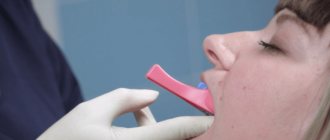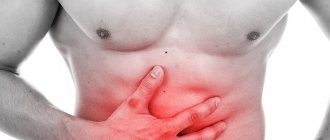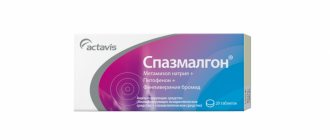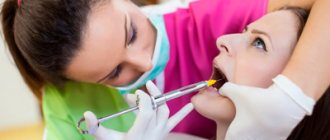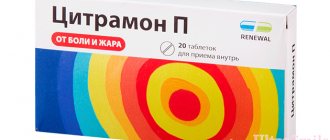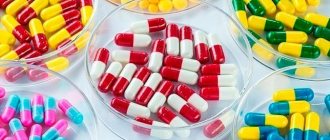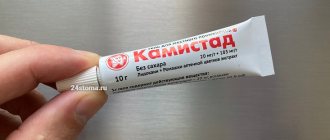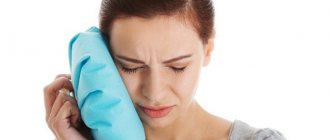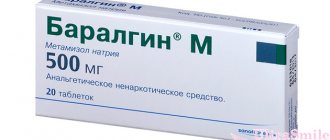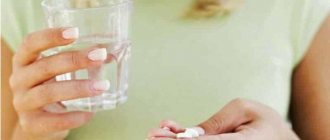From this article you will learn:
- release forms and analysis of the composition of the drug,
- application diagram, patient reviews,
- price in pharmacies for Kamistad gel, its analogues,
The article was written by a dentist with more than 19 years of experience.
Kamistad gel is a line of preparations for topical use in the oral cavity, intended for anesthesia of the oral mucosa or red border of the lips. The drug is available in 2 forms: firstly, it is Kamistad Baby gel, used in young children during teething, and secondly, the classic Kamistad gel for adults and children over 12 years of age.
The drugs are produced at the factories of the German company Haupt Pharma. In Russia, drugs are distributed through the pharmaceutical company Nizhpharm. The latter is probably known to every consumer from the drug D-Panthenol. Next, we will tell you in what situations gels from the Kamistad line will have a good effect, and in what situations it would be better to prefer drugs from other manufacturers.
Geli Kamistad and Kamistad Baby –
Indications for use –
The drug Kamistad Baby for young children has only 1 indication for use - to reduce pain during teething. If we talk about the form of the drug for adults and children over 12 years old, then for Kamistad the instructions for use contain the following indications for the use of the gel -
- with gingivitis,
- pain when wisdom teeth erupt,
- for stomatitis and cheilitis,
- in case of injuries to the mucous membrane with removable dentures, braces,
- after dental interventions (for example, to anesthetize an area of the mucous membrane where an anesthetic was injected, etc.).
Important: it should be noted that Kamistad gel will not be the optimal remedy for all these indications. For example, we do not recommend this drug for numbing abrasions under dentures. The fact is that benzalkonium chloride, which is part of the gel, tends to cause irritation of the mucous membrane, so what can we say about the injured mucous membrane.
For stomatitis, the gel can only have a symptomatic effect, i.e. relieve pain when painful ulcerations occur. But you need to understand that Kamistad does not affect the cause of stomatitis. For gingivitis, this drug will also not be the best choice, and by reading the reviews of the drug below, you will understand why.
Kamistad: composition and release form
Kamistad is a modern drug for the treatment of dental diseases. This drug effectively reduces pain and inflammation in the mouth and lips. The German company produces the drug in children's and adult forms, 10 g each in an aluminum tube. Kamistad gel has an anti-inflammatory and strong analgesic effect due to the content of the following components:
1. Kamistad for adults 2% (content per 100 g of gel):
- lidocaine (monohydrate) – 2 g;
- chamomile flower extract – 18.5 g.
Auxiliary components: 200 mg of 50% benzalkonium chloride solution, 100 mg of camphor cinnamon oil, 100 mg of sodium saccharinate, 1.5 g of carbomer, 40 mg of 98% formic acid, 2.81 g of trometamol, 820 mg of 96% ethanol, 73.93 g distilled water.
2. Kamistad for children:
- polidocanol;
- extract from chamomile flowers.
Auxiliary components: carbomer, glycerol, water, propylene glycol and other components. The excipients also include flavors (mint and honey), they give the gel a pleasant smell and taste, which children especially like.
Why is this composition so good?
The gel quickly relieves pain and effectively relieves inflammation due to the content of antiseptics and anesthetics in the composition. Chamomile extract acts as an antiseptic, which has an anti-inflammatory and healing effect. Anesthetics (lidocaine and polidocanol) relieve itching, cool, soothe the mucous membrane, and also block pain impulses from the first seconds of applying the gel.
Purpose of Kamistad gel
Dentists recommend using Kamistad for diseases such as:
- stomatitis of any etiology;
- gingivitis;
- cheilitis (inflammation of the lips);
- erythema of the lips.
Dental gel can also be used in the following cases:
- in case of injury to the oral mucosa (from the use of dentures, after operations);
- with irritation from wearing braces;
- during teething
;
- during orthodontic and dental procedures.
Kamistad gel is an immediate local anesthesia; the drug effectively eliminates inflammation, regenerating the tissue of the lips and oral mucosa.
What and when to eat
During the rehabilitation period, food should be soft, mostly liquid, and have a comfortable temperature. How much you can’t eat after tooth extraction depends on whether there is heavy bleeding or not. If blood clotting is normal, then a protective clot is formed and securely attached within 2 to 3 hours. After this, the restriction is lifted. With complex extraction, the time can increase to 4.6 hours.
It is advisable to exclude spicy, sweet foods, carbonated drinks, alcohol, raw vegetables, fruits with a high acid content. Chewing is carried out on the opposite side of the jaw. It is better not to eat rough, hard food, as you may accidentally touch the wound.
Contraindications of the drug
As experts note, Kamistad gel is very well tolerated by patients, however, due to the specific composition, the product is not recommended for use in the following cases:
- with arterial hypertension;
- with heart failure;
- with bradycardia (slow heartbeat);
- with renal failure;
- during lactation and pregnancy;
- with liver failure;
- if the child's age is less than 3 months.
It is also not recommended to use the gel in patients who have hypersensitivity to lidocaine, chamomile or auxiliary components of the drug.
General recommendations
Extirpation ends by placing a cotton swab on the operated area. If the bleeding is minor, it can be removed after a few minutes. In case of increased bleeding, it is allowed to keep the cotton wool for up to half an hour; if the process continues, the doctor uses hemostatic drugs. When the cotton wool is held for too long, the blood clot may stick to it and fall out, and the socket with the bone will lose its natural protection from the external environment.
How to stop bleeding after tooth extraction at home:
- apply a special hemostatic sponge (sold in a pharmacy);
- make a tight swab from sterile gauze, apply to the hole and bite;
- if the problem is caused by increased blood pressure, then you need to take appropriate medications;
- use ice or frozen foods pre-wrapped in a towel as a cooling compress.
Smoking after tooth extraction is unacceptable, since cigarettes contain nicotine, which constricts blood vessels. As a result of this action, the cells do not receive the required amount of oxygen and nutrients, so the regeneration processes slow down, the risk of infection increases, scarring and improper tissue fusion are possible.
On the day of surgery, you should not rinse your mouth, engage in sports or other physical activity; it is best to go home from the clinic and rest. Routine oral hygiene or rinsing is not recommended.
In nutrition, preference should be given to soft, liquid and warm foods.
special instructions
What do dentists recommend to their patients when they prescribe Kamistad?
Before use, you should always wash your hands thoroughly to avoid introducing infection into the oral cavity. Under no circumstances should the gel get into your eyes.
Benzalkonium chloride (antiseptic), which is part of the gel, can cause the formation of black pigment plaque on tooth enamel. Chromatogenic staining of enamel is a temporary and non-hazardous defect, but it does not go away on its own and must be removed in the dental office with professional teeth cleaning.
.
How long does it take for a tooth to heal after extraction?
If the extirpation is successful and there is no bleeding, then on the second or third day the hole becomes covered with a grayish coating, and by the end of the week it becomes bright pink. When pressing on the gum, the exudate does not come out. The swelling completely subsides and the pain goes away. The processes of restoration of soft and bone tissues begin.
What not to do on the first day so as not to damage the formed clot:
- rinse your mouth intensively;
- lick the hole;
- blow your nose;
- spit;
- brush your teeth.
After two weeks, the mucous membrane acquires a healthy color, the hole is not visualized as a separate part, since by this time the epithelial layer is completely restored.
How long a wound heals after tooth extraction depends on the presence or absence of complications. If everything is in order, then after about a month the replacement of the void in the socket with bone and connective tissue is almost complete. We can talk about complete healing after 3 or 4 months. By this time, a smooth surface has formed in place of the removed dental unit, which does not in any way remind of the operation performed.
Kamistad: instructions for use
Kamistad is very easy to use, but before use it is necessary to carry out preparatory procedures: wash your hands thoroughly, dry the mucous membranes of the mouth and lips with a dry gauze swab.
To relieve pain, 1 drop of dental gel is enough. The gel is applied to the finger and gently rubbed into the problem area.
Children are allowed to use Kamistad Baby no more than 3 times a day; adults use Kamistad as needed, but no more than 6 times a day.
In the process of adaptation to dentures, the product is applied to the diseased area, and then the denture
installs immediately. If ulcers appear in your mouth, you should urgently contact a dental clinic for advice.
The drug contains benzalkonium chloride; for this reason, the gel is not allowed to be used for stomatitis with erosions and ulcers in the mouth. It also makes sense to use a dental drug only as part of a complex treatment; Kamistad itself cannot cope with aphthous or herpetic stomatitis, since it does not have the necessary anti-inflammatory and antiviral properties.
Kamistad and similar drugs –
As we said above, the price for Kamistad gel in pharmacies starts from 280 rubles per 10 g tube. The price is almost the same for both adult and pediatric forms of the drug.
It must be said that today the drug does not have cheaper analogues. However, below we list pain-relieving dental gels with a different composition, which can also be used in children and adults. Kamistad: drug analogues
- The drug Kalgel –
This dental gel also contains lidocaine and cetylpyridinium chloride as an antiseptic.
The analgesic effect of this gel will be less, because... its lidocaine concentration is 6 times lower. Can be used from 5 months of age. The drug Kalgel - price from 350 rubles per 10 g tube. Kalgel or Kamistad: which is better due to the lower concentration of lidocaine in Kalgel - the depth of pain relief will be significantly lower. However, firstly, the drug can be used 5 times a day, and secondly, if you need a pronounced antiseptic effect and only a slight pain reliever, then Kalgel will be the best choice.
- Cholisal (instructions for use) –
This gel has a pronounced anti-inflammatory effect, as well as a good analgesic effect that is longer lasting.
It can be used for inflammation of the gums, for pain relief in erosions and ulcerated areas of the mucous membrane with stomatitis, including in young children. But when teething in infants, it should not be used, because... Thanks to the anise content, the drug strongly stimulates salivation. The cost of the gel will be from 400 rubles per 10g tube.
- Solcoseryl (instructions for use) –
if you need to anesthetize painful erosions due to stomatitis and at the same time significantly accelerate their epithelization, then this gel will be the best choice. However, you can start using it after the acute phase of inflammation has subsided. But for 2022, the price for a 20g tube will be about 2,500 rubles.
Features of use during lactation and pregnancy
According to the original instructions, contraindications include lactation and pregnancy. However, this is not a strict contraindication; in practice, the dentist can recommend the drug to patients if absolutely necessary. However, during such an important period, it is better for women to give preference to alternative drugs such as Cholisal or Metrogyl Denta.
"Cholisal" relieves inflammation, pain and kills pathogenic microorganisms. According to the original instructions, it can be used by women both during pregnancy and lactation, but with caution, not exceeding the dose of the drug.
"Metrogid Dent" is only suitable for relieving inflammation; the drug cannot boast of an analgesic effect like Kamistad. This dental gel is only allowed to be used by pregnant women during the 2nd and 3rd trimesters. During lactation, the drug should not be used either; the active components easily pass into breast milk, but if necessary, breastfeeding can be stopped.
Kamistad during pregnancy and lactation -
Kamistad gel is contraindicated during pregnancy and breastfeeding. If you need a drug to anesthetize the mucous membrane/relieve inflammation, then in this case the optimal alternative is only CholisalGel,” because According to the manufacturer's instructions, this dental gel can be used throughout pregnancy and breastfeeding, but “with caution.”
The term "caution" implies that you should not use this gel unsupervised and continuously - it must be prescribed by your dentist, and you must notify your obstetrician-gynecologist before you start using it. We hope that our article on the topic: Kamistad gel instructions for use was useful to you!
Sources:
1. Dental education of the author of the article, 2. Personal experience as a dentist, 3. Personal experience of using Kamistad gel, 4. “Therapeutic dentistry. Textbook" (Borovsky E.V.), 5. https://kamistad.ru/.
Kamistad: reviews from specialists and patients
Dentists speak very positively about Kamistad and call it an emergency solution for toothache. Patients who used this product reported effectiveness and rapid action. You don't have to wait long, just a few seconds after application and the pain goes away. Some patients suffering from stomatitis used the gel a few minutes before meals - this reduced pain during meals and provided comfort.
For children who are teething, this drug is very necessary; the gel not only reduces pain, but also relieves irritation, inflammation and calms the child.
If your gums are inflamed
It is not always possible to avoid infection of the wound surface, especially when the patient neglects the advice of the dentist. In case of inflammation, you should consult a doctor for examination and identification of the causes of inflammatory reactions.
If the hole is not closed after tooth extraction, alveolitis develops. The natural plug can come off due to intensive rinsing, licking the wound with the tongue, resumption of bleeding and improper actions to stop it. Alveolitis is accompanied by acute pain syndrome. Not only the injured area may hurt, but also the throat, head, jaws, and neighboring teeth.
How long the gums heal after tooth extraction depends on various factors:
- complications of surgical intervention;
- the presence of inflammation or other complications;
- age criterion, the older the patient, the longer the healing and tissue restoration takes place;
- state of immunity, individual characteristics.
What benefits do dentists and patients report?
- Versatility of use.
The drug is available in two forms, which allows it to be used by both children and adults.
- In
normal doses, the drug is inert and does not react with other drugs
, which makes it possible to include it in combination therapy. - No side effects or overdose
, if you use the drug according to the instructions. Otherwise, redness, burning and itching may occur at the application site, and in severe cases, swelling of the oral mucosa may occur.
- The gel contains sugar.
- The gel form of the product allows the active components to penetrate quickly and deeply into the tissues
, providing a strong and long-lasting analgesic effect.
- Kamistad gel does not affect the psychomotor state of the patient
, so it can be used while driving vehicles or working with complex mechanisms.
- Children enjoy the taste and smell of Kamistad Baby
.
- The gel is applied topically
, the effect is instant.
- Availability and popularity.
Kamistad is sold without a prescription, so you can easily purchase it at any pharmacy.
- There is no need to store the product in the refrigerator
, besides, after opening the tube, Kamistad is suitable for up to 1 year.
Pathology and norm
With any invasive procedure, swelling occurs in the soft tissues. It goes away on its own within a few days. The same can be said about pain. Cheekbones, adjacent teeth, head, and neck may hurt. If after 3 or 4 days the symptoms do not disappear, but increase, then this indicates pathology.
What are the complications after tooth extraction:
- alveolitis, osteomyelitis, most often occurring with dry socket;
- inflammation near the seams;
- damage to the adjacent dental unit;
- perforation of the bottom of the maxillary sinus, if extraction is performed on the upper jaw;
- fracture of the alveolar process, sharp edges of the alveolus that injure soft tissues;
- neuritis of the inferior alveolar nerve;
- postoperative cyst;
- paresthesia, which is characterized by numbness, loss of sensitivity of the cheeks, tongue, jaw and other adjacent areas;
- ondogenic phlegmon, periostitis;
- a hematoma in the neck can occur in people suffering from arterial hypertension (blood leaks out of the vessels into the tissue);
- soft tissue abscesses.
Pus and flux after tooth extraction characterize an acute inflammatory process that requires urgent treatment. Purulent inflammation can occur with insufficient antiseptics during surgery or poor postoperative care, with a dry socket, when food particles get into the hole. A new surgical operation is required to remove necrotic masses.
When to see a doctor:
- on the second and third days the swelling does not subside, but the cheek continues to swell;
- the pain becomes more intense and is difficult to eliminate with medications;
- the high temperature lasts for several days, normally it should decrease within 24 hours;
- no appetite, nausea, weakness;
- when pressing on the gum, pus is released, and its edges turn red;
- when palpating the hole with the tongue, no blood clot is detected.
If inflammatory processes are started, this can lead to the melting of bone tissue, an abscess and the spread of infection.
Gel Kamistad: analogues and prices
Gel Kamistad - the price is about 250 rubles (data as of March 2017), there are no direct analogues at a lower price.
Analogues of Kamistad in terms of therapeutic effect:
- Holisal.
- Luan.
- Dantol, Dentol baby.
- Kalgel.
- Lidocaine.
- Lidoxor.
- Dentagel.
- Solcoseryl and others.
Comparison with other drugs
The properties of the drug “Kalgel” are very similar to Kamistad; it also contains lidocaine and a chemical antiseptic. The only difference between the Kalgel gel is that its anesthetic effect is weaker and can only be used by children from 5 months. However, “Kalgel” can be used even for ulcerative stomatitis; it also provokes less salivation, which is very good if it is necessary to numb the teeth of a one-year-old baby.
Cholisal gel has a wider spectrum of action than Kamistad, it relieves pain, relieves inflammation, and destroys pathogenic microorganisms. However, the anise oil included in the composition provokes strong salivation, so it is not recommended for use in infancy.
The article was written by a dentist with 12 years of experience!
What medications are needed?
Antibiotics after tooth extraction are prescribed by the surgeon who performed the extraction. You can replace medications from the list with cheaper analogues, the main thing is that they have a wide range of applications, since there are different microorganisms in the mouth. Amoxiclav is often prescribed because it is effective and has a minimum of contraindications and side effects. The drugs are taken in the course determined by the doctor.
Anesthesia after tooth extraction lasts for several hours, after which pain appears, which can be eliminated with the help of analgesics. Anti-inflammatory drugs, for example Nimesil, and vitamins to strengthen the immune system can also be prescribed.
How to rinse your mouth after tooth extraction:
- chlorhexidine;
- a weak solution of potassium permanganate;
- furatsilin;
- miramistin;
- similar antiseptics.
In addition to pharmaceutical products, rinsing can be done with soda, saline solutions, decoctions of chamomile, sage, oak bark, calendula, and eucalyptus. They not only protect against infection, but also relieve swelling and accelerate tissue healing.
Temperature after tooth extraction is one of the possible symptoms, as tissues are injured and foreign elements penetrate the body. To improve your health, you need to take antipyretics.
